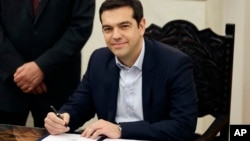An economist who has been an outspoken critic of Greece's bailout deal with international lenders was named Tuesday as the country's finance minister in the new leftist government.
Anti-austerity Greek Prime Minister Alexis Tsipras picked Yanis Varoufakis for the key economic portfolio as he named other political supporters to his Cabinet after his Syriza party swept to victory in Sunday's election.
Varoufakis, who holds dual Greek and Australian citizenship, will now play an important role in Greece's negotiations with the lenders. Greece is seeking to eliminate some of its massive debt and ease austerity measures the creditors forced on the country in exchange for more than $300 billion in bailouts.
Tsipras also named Panos Kammenos, the leader of the Independent Greeks party, as defense minister after he joined with the Syriza party to quickly form a coalition government, ousting former Prime Minister Antonis Samaras.
In the immediate hours after Syriza's victory, European leaders took a tough stance against Greece, demanding that it keep its financial commitments to pay back its loans and keep in place pension and wage cuts and other austerity measures if it wanted to remain in the continent's 19-nation euro currency bloc. But later, the pointed remarks aimed at Athens softened.
German Chancellor Angela Merkel, the eurozone's chief austerity advocate, congratulated Tsipras on Tuesday, wishing him "much strength and success."
The leader of the eurozone's finance ministers, Dutch Finance Minister Jeroen Dijsselbloem, said he would visit Athens on Friday to meet with the new Greek leaders.
"We will support them in their quest for the economic recovery of Greece," he said. "We are glad to hear that their ambition is to realize this, of course, within the eurozone, and that is exactly also our ambition. We stand ready to support them in that ambition."
Prime Minister Tsipras officially took power Monday, after an election campaign in which he vowed to end the severe austerity measures that have led to sharp pension and wage cuts, higher taxes and massive unemployment.
Greece's trio of international lenders - the European Union, International Monetary Fund and European Central Bank - has shown no inclination it will renegotiate terms of their bailouts. Burt the creditors said they will discuss Greece's financial affairs with the new government.
Investors' fears over the impending clash between the new government in Athens and its lenders drove European stock markets down slightly by midday Tuesday, while Greece's stock market plunged more than 2 percent.
Also on Tuesday, Moody's ratings agency warned that Syriza's victory had produced a negative result for Greece's credit rating.





